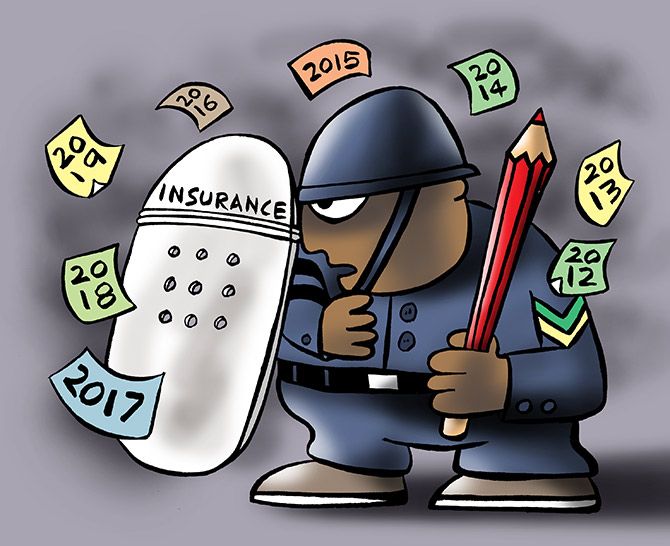Customers should be fully aware of what their policy covers and should follow claim procedures meticulously, says Sanjay Kumar Singh.
Illustration: Uttam Ghosh/Rediff.com

If you have bought a health or motor policy, you will have to deal with intermediaries like third party administrators (TPAs) and surveyors respectively.
In its recently published annual report, the Executive Council of Insurers (ECOI), the body that supports the office of the ombudsman, has made a few critical observations about these intermediaries.
About TPAs, the report says their decisions on settlement of claims should not be final and the matter should be reviewed by the insurer to arrive at a judicious decision.
As for surveyors, it comments that the assessment of surveyors on the quantum of loss in motor claims is not in tune with the desired repairs and the reason for not allowing the estimated items is not explained.
The report further adds that TPAs and surveyors add significantly to the woes of hapless customers.
TPA recommends, insurer decides
The TPA is the entity that processes your claim.
It does so according to the claim settlement guidelines provided by the insurer and then makes a recommendation to the latter.
"The insurance contract is between the insurer and the customer, so the final decision on whether to accept or reject a claim is made by the insurer," says Nayan Shah, founder and managing director, Paramount Health Services and Insurance TPA.
Experts, however, say that insurers go with their TPA's recommendation in most cases.
According to Arvind Laddha, deputy chief executive officer, JLT Independent Insurance Brokers, "Only in cases where the insured has an issue with the decision do insurers usually review the case."
According to the ECOI report, some insurance companies do not even send a repudiation letter to their customers.
The letter from the TPA is the only correspondence that policyholders receive.
"If a TPA writes to a claimant that your claim has been rejected, that is not right according to law, since the contract is between the insurer and the insured," says Shah.
Condition not covered
According to TPAs, claims get rejected because they do not fit into the claim settlement guidelines provided to them by the insurer.
For instance, certain conditions like hernia and cataract, which do not require immediate treatment, are not covered in the first and second year of the policy.
If a customer gets operated and then makes a claim within this period, it will not be paid.
Similarly, most policies do not cover pre-existing diseases for two to four years.
Another reason for claims getting rejected is lack of proper documentation.
A customer, for instance, may have submitted the receipt but he may not have attached the MRI report.
"If the TPA feels that the presence of the MRI report is necessary for settling the claim, it could be rejected," says Laddha.
Get to know your policy well
Customers, on their part, can take a couple of steps to reduce the chances of their claims being rejected.
According to Shah, they should acquire a good knowledge of what their policy covers and what it does not.
Customers, for instance, complain that their bill was not reimbursed fully, but are often unaware that their policy has caps, such as for room rent, intensive care unit, and so on.
Any cost they incur above the cap has to be paid out of their own pocket.
Second, the insured should be meticulous in providing documentation when making a claim.
Cover yourself comprehensively
Surveyors are the people who inspect your vehicle, assess the damage, and give an estimate to the insurer.
A motor insurance customer's claim could be turned down or be only partly reimbursed due to a variety of factors.
Says Rahul Sharma, vice president and head of claims, Bharti AXA General Insurance: "It could happen because the loss was caused by a peril that the insured was not covered for. Perhaps the customer did not opt for maximum coverage through the many add-ons available."
"It could also happen if there was material non-disclosure at the underwriting stage or misrepresentation of facts at the time of claim," Sharma adds.
According to experts, the risk of under-assessment is lower in a cashless claim and higher in a reimbursement claim.
"In a cashless claim, under-assessment is usually not an issue since you send your vehicle to a garage that already has a link with the insurer. Customers are more likely to encounter this problem in reimbursement claims," says Naval Goel, chief executive officer, Policyx.com.
The fault, according to Goel, can lie on both sides.
Sometimes customers make inflated claims.
At other times, it could be the surveyor trying to lower cost.
"Surveyors trying to beat down the claim amount to reduce the cost to the insurer does happen," says Goel.
Sometimes, the surveyor could be trying to squeeze a bribe out of the customer.
Opt for cashless facility
At the time of buying the policy, get a good understanding of your needs and buy suitable add-on covers.
If a claim arises, provide the correct details of your losses in the claim form without delay.
"At this stage, do not get influenced by unauthorised consultants or intermediaries who may try to encourage you to falsify or inflate your claim," says Sharma.
Customers should use cashless garages as far as possible.
In a reimbursement claim, if the surveyor says that the cost is lower than you expect, ask him to state this in writing.
"If your claim amount is genuine, this will help you prove your case before the ombudsman," says Goel.
Alternatively, ask the surveyor to offer a garage where the repair work can be done at a lower cost.
If the issue does not get resolved, ask the insurer to send another surveyor.
If despite all the above-mentioned steps and precautions, you feel that you have got a raw deal at the hands of a TPA or surveyor, complain to the grievance cell of the insurer.
The office of the ombudsman (see table) and consumer court are other fora you can approach for redress.
- The address of the office of the ombudsman in your city is available in your policy document and on the ECOI Web site (www.ecoi.co.in)
- Ther is no fee and you don't need a lawyer to present your case.
- After getting documents from both parties, the ombudsman calls both for a hearing and then decides.
- The ombudsman can award a claim, if it has been rejected, but it can't penalise the insurer, as a consumer court can.












 © 2025
© 2025